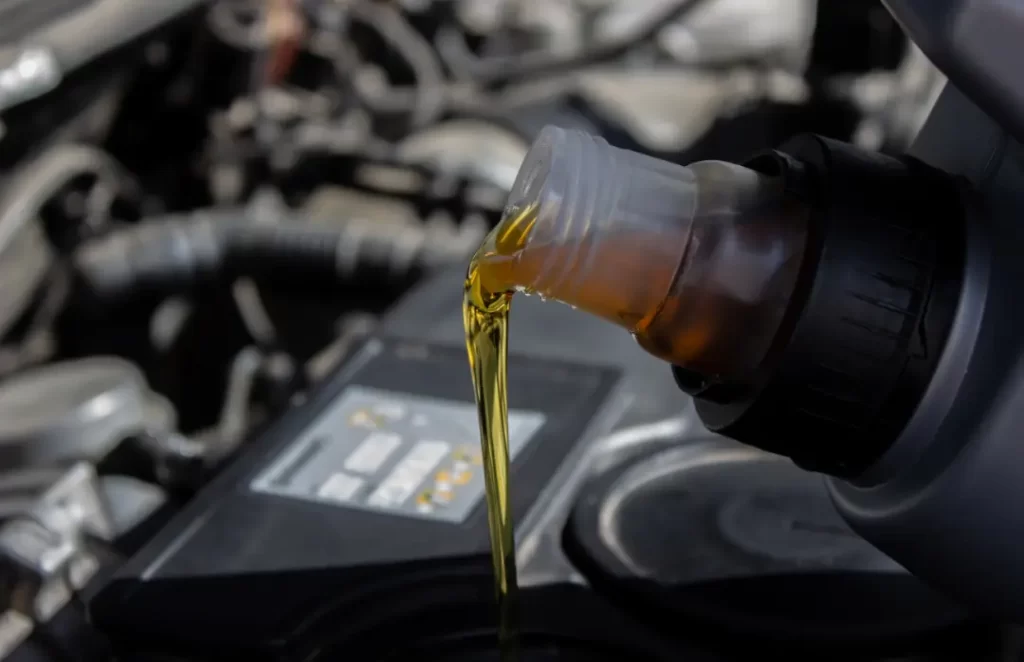Wondering how long an oil change takes? Typically, it takes between 15 minutes and an hour. This depends on where you get it done and your vehicle type.
In this article, we’ll dive into the average oil change times, quick service options, detailed procedures, factors affecting duration, and tips for efficient scheduling.
Key Takeaways
- An oil change typically takes 15-60 minutes, depending on the service centre and vehicle type, with quick-service centres completing changes in as little as 15-20 minutes.
- Regular oil changes are essential for optimal vehicle performance, extending engine lifespan, and preventing costly repairs due to sludge buildup and wear on moving parts.
- Choosing the right type of oil and adhering to recommended change intervals, typically every 5,000-10,000 miles based on oil type, is crucial for maintaining engine health.
Average Time for an Oil Change
On average, an oil change can take anywhere from 15 minutes to an hour, depending on various factors.
At professional service centres, the process typically takes about 30 to 45 minutes due to specialised equipment and experienced technicians. Dealership services, on the other hand, might take longer, typically around 45 to 60 minutes, as they often include additional checks while waiting. average car service duration explained is influenced by several factors including the type of service, the vehicle model, and the specific tasks required. Understanding these variables can help customers better plan their time and manage expectations when visiting service centres. Additionally, being aware of peak times at dealerships can also affect how long the service may actually take.
Factors like the amount of oil needed and the choice of garage can significantly impact the wait time.
Knowing the average time for an oil change helps you plan better and avoid unexpected delays. Whether you choose a quick-service centre or a more comprehensive dealership service, understanding these time frames helps you schedule your day efficiently and keep your engine running smoothly.

Quick Service Options
For those with busy schedules, quick-service oil change centres offer a lifesaver. These centres are designed to provide fast and efficient service, typically completing the job in just 15 to 20 minutes.
This rapid turnaround time is perfect for individuals who need a reliable and quick solution without compromising on quality.
Quick-service car options are designed to save you time and money. These services focus solely on the oil change process, minimising wait time while ensuring proper disposal of old oil and secure installation of the new filter, new oil filter, and old filter, along with an Oil and Filter Change.
It’s an excellent way to extend the life of your engine in the long run without spending hours at a service center. Next time you’re pressed for time, consider a quick-service oil change to keep your vehicle in top shape.
Detailed Oil Change Process
Understanding the detailed oil change process can demystify what happens under the hood during this essential maintenance task. The process begins with:
- Draining the old oil from the engine by removing the sump plug and allowing the dirty oil to flow out.
- Removing the old oil filter.
- Replacing it with a new oil filter will ensure the vehicle’s oil level is maintained correctly.
After the old oil is drained and the filter is changed:
- Securely replace the drain plug.
- Lubricate the new oil filter around its gasket before installation.
- Add fresh oil to the engine.
- Run the engine briefly to allow the new oil to circulate properly.
This step ensures that the oil reaches all engine components, reducing friction and wear.
Finally, after the new oil has circulated, the vehicle’s oil level is checked to ensure it’s at the correct level. Inspecting the oil filter and drain plug for leaks is also crucial to prevent any future issues.
Factors Influencing Oil Change Duration
Several factors can influence the duration of an oil change, making it a task that varies from one vehicle to another. Smaller passenger vehicles typically require 20 to 30 minutes for an oil change. Larger vehicles like trucks and SUVs can take 45 minutes or even over an hour due to their size and complexity.
The vehicle’s design and engine size are significant factors that affect oil change duration. Opting for a maintenance check during the oil change can increase the total time taken. Thorough services require extra time compared to basic maintenance tasks.
The technician’s experience level also plays a significant role, with seasoned professionals able to complete the job more swiftly, potentially saving a few seconds and 10 to 15 minutes.

DIY vs. Professional Oil Changes
When deciding between DIY and professional oil changes, several factors come into play. If you’re new to DIY oil changes, the process may take longer due to unfamiliarity with the steps involved.
While DIY oil changes are often chosen to save money, the overall cost-effectiveness can vary, especially if mistakes lead to costly repairs.
Professional oil change services offer the advantage of additional vehicle checks, which might be missed during a DIY change. These checks can identify potential issues before they become serious problems, helping to prevent costly repairs down the line. However, DIY enthusiasts often enjoy the hands-on experience and the satisfaction of maintaining their vehicle themselves.
One downside of DIY oil changes is the potential mess and the need for proper disposal of used oil and dirt. Professional services handle these aspects efficiently, ensuring that the costs of oil disposal are managed correctly and that the vehicle receives a thorough inspection.
Benefits of Regular Oil Changes
Regular oil changes are essential for maintaining your vehicle’s health and performance. The primary benefits include:
- Maintaining fuel efficiency, as clean oil reduces friction and allows the engine to run smoothly.
- Extending the lifespan of the engine by preventing sludge buildup.
- Reducing wear on moving parts.
Oil changes ensure that all engine components are well-lubricated and functioning correctly.
Without regular oil changes, serious damage can occur to the engine, leading to costly repairs that could have been avoided. Using the correct oil is also crucial, as the wrong type can lead to engine overheating and clogging due to sludge buildup.
Regular oil changes can improve performance and prevent costly repairs, reduce emissions, and benefit the environment.
Choosing the Right Oil for Your Car
Choosing the right oil for your car is crucial for optimal performance and longevity. Factors such as the make, model, year, and engine type of your vehicle influence the choice of oil.
Synthetic oil, conventional oil, and blends each have their specific benefits and applications, making it essential to select the oil type that aligns with your vehicle’s specifications.
Car engine oil consists of base oils and additives that enhance its performance, reducing friction and improving fuel efficiency. Using the correct oil type ensures that your engine runs smoothly, reducing wear on moving parts and preventing potential issues.
Always refer to your vehicle’s manual or consult a professional to determine the best oil type for your car.

How Often Should You Change Your Oil?
Knowing how often to change your oil is crucial for maintaining your vehicle’s health.
Typically, it’s recommended to change your oil every 5,000 miles or every six months. However, the frequency can vary based on the type of oil used. Changes are generally advised every 3,000 to 5,000 miles for conventional oil, while synthetic oil can last between 7,500 and 10,000 miles.
Other factors, such as driving conditions and vehicle specifications, may require more frequent oil changes. For example, severe driving conditions, like frequent short trips or driving in extreme temperatures, necessitate more frequent changes.
Why Choose All Vehicle Services?
Choosing All Vehicle Services means entrusting your car to highly experienced technicians with over 50 years of combined experience in vehicle maintenance and repair.
At All Vehicle Services, we are committed to providing exceptional customer service and value for money, ensuring that clients feel satisfied with the work performed. We work to enhance customer satisfaction by maintaining transparency throughout the service process, making us a one-stop shop for all your vehicle needs.
With a comprehensive range of additional services, All Vehicle Services offers convenient access, booking, and prompt service. Our commitment to affordability, transparency, and customer satisfaction sets us apart. We offer reliable and trustworthy service for all your vehicle needs. Book a service at our garage today.
Frequently Asked Questions
How long does an oil change typically take?
An oil change typically takes between 15 minutes to an hour, depending on the service centre and your vehicle type. It’s best to check with your local service provider for specific timing.
What are the benefits of regular oil changes?
Regular oil changes improve fuel efficiency, extend engine lifespan, enhance performance, and lower emissions. Prioritising this maintenance can lead to substantial long-term benefits for your vehicle.
How often should I change my oil?
You should change your oil every 5,000 miles or six months, while synthetic oil can be changed between 7,500 and 10,000 miles. Regular maintenance is essential to ensure your engine runs smoothly.
What factors influence the duration of an oil change?
The duration of an oil change is influenced by factors such as the type of vehicle, engine size, additional maintenance checks, technician experience, and whether specialised tools are required. Understanding these elements can help set realistic expectations for service time.
Why should I choose All Vehicle Services for my oil change?
Choosing All Vehicle Services for your oil change is beneficial due to our competitive pricing, skilled technicians, and a strong commitment to customer satisfaction and transparency. You can trust us for comprehensive service that meets your needs.
Conclusion
Understanding the oil change process, the average time it takes, and the factors that influence it can help you make informed decisions about your vehicle’s maintenance.
Regular oil changes are essential for maintaining fuel efficiency, engine longevity, and overall vehicle performance. Whether you choose DIY or professional services, knowing the benefits and drawbacks of each option ensures you can keep your car in top condition.
By choosing the right oil, scheduling your oil changes efficiently, and entrusting your vehicle to reputable service centers like All Vehicle Services, you can save time, money, and avoid costly repairs. Regular oil changes are a small investment that pays off in the long run, keeping your engine running smoothly and your vehicle on the road for years to come.


